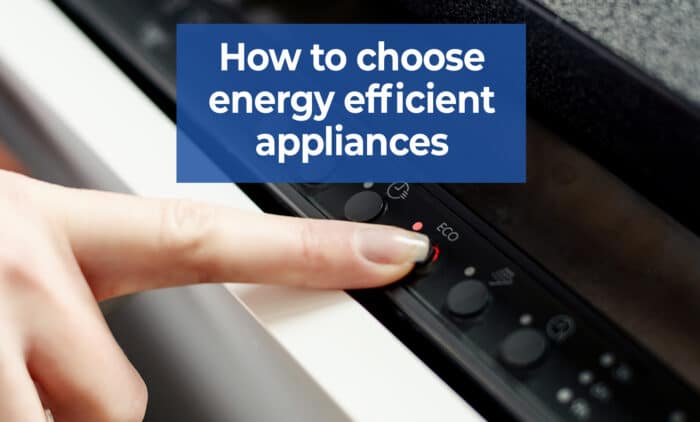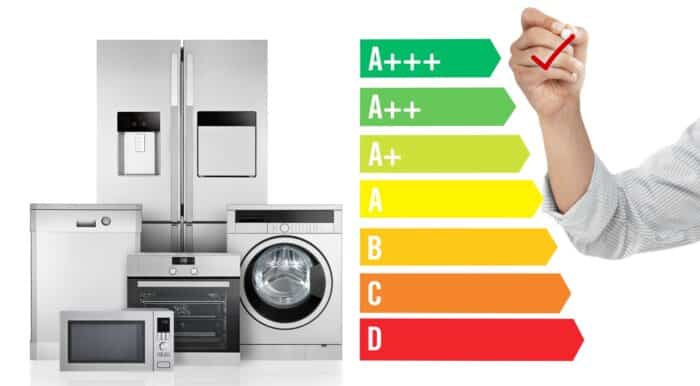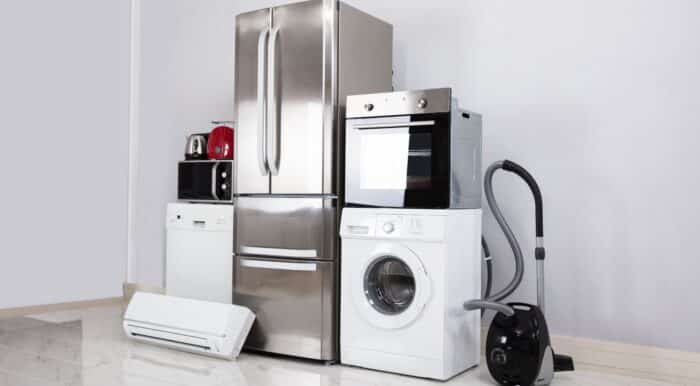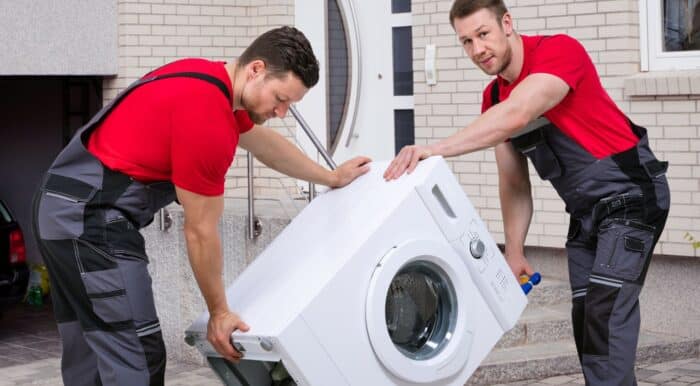Do you consider energy efficiency when buying a new appliance? All home appliances come with an energy label. This will help you choose an appliance that will use less energy. Therefore reducing your energy bills each year – making it both better for the planet and for your pocket.

Understanding Energy Labels
So how do we choose energy efficient appliances? Energy labels score your appliance from A (or the older A+++) for the most energy efficient appliance to G for the least. Appliances are tested for typical use to see how much energy they use.
This doesn’t mean that two appliances of the same grade use the same amount of electricity. For example, a large A rated double fridge will use more electricity than a small single A rated fridge. However, it does mean that for two comparable products, the better rating product will be more energy efficient. Therefore costing less to run, winning!
You can find out more about energy rating labels and check appliance ratings here.

Don’t leave your appliances on standby
Did you know that the average UK household spends £55 (45kg CO2e) per year from leaving appliances on standby?
Lots of household appliances use small amounts of electricity whilst sitting idle on standby. Simply switching them off when not in use is a great way to make savings. Every penny counts!
As we all have a number of appliances there luckily are a number of products available to help cut down standby electricity usage. Standby savers for example allow you to switch off all your connected appliances in one go and some are available with timers too – so you don’t need to worry about forgetting to switch them off.
Read our article here about the worst appliance to leave on standby.
How to choose energy efficient appliances

Here we have some useful tips about common appliances to consider that might help you save energy:
- Ovens
Ovens are one of the most energy using appliances so choosing an energy efficient model is very important. Some have a pyrolytic cleaning function – but beware these are energy intensive! Energy labels can be found on both electric and gas ovens.
- Microwave ovens
Unlike ovens, microwaves only heat your food (an oven heats the space inside your oven), this often means cooking food in your microwave can be cheaper than switching on the oven.
- Dishwashers
Up to 8% of our electricity bill is spent using the dishwasher, typically between £40 – £80 (35 to 65kg CO2e) a year. A little less for slimline models using around £30 – £60 (25 to 50kg CO2e) a year to run.
The most energy efficient A rated dishwasher could save you around £25 per year compared to the least energy efficient.
- Fridges, freezers and fridge-freezers
Our fridges/freezers are switched on 24 hours a day, every day. They are also some of our longest lasting appliances in the home making choosing an energy efficient fridge freezer a worthwhile investment. Over a 17 year lifetime an A-rated fridge freezer could save you £580 (610kg CO2e) when compared to an F-rated model.
Please be aware when choosing your new fridge freezer that ratings are categorised by size, so a smaller fridge will use less energy than a larger fridge of the same rating.
- Kettles
The kettle is one of our most used appliances in the home. Try to avoid over filling your kettle and you could save £11 per year on your electricity bills (9kg CO2e).
- Tumble Dryers
The energy label on tumble dryers scale from A+++ to D and choosing an A+++ model could save you £790 (820kg CO2e) over a 13-year lifetime compared to a B-rated model.
Some dryers include sensors to detect when clothes are dry enough which can save energy and electric heat pump dryers are more efficient as they recycle heat from the ventilation tube back into the dryer.
Where possible, dry your clothes on a line outside as it is free or on a drying rail inside. Although keep in mind to keep the room ventilated to avoid damp issues.
- Washing Machines
An A-rated energy efficient (rated from A to G) washing machine can save you both on electricity use and also water use too. This could save you £105 (105kg CO2e) over it’s 11-year lifetime compared to a D-rated model.
Washing on lower temperatures and only when you have a full load to wash will also reduce your energy usage.
- Desktop, laptop, PCs and tablets
Tablets use on average 70% less energy than laptops, which in turn use 65% less energy than a desktop PC. Choosing a laptop and avoiding leaving on standby could save you up to £35 (30kg CO2e) per year compared to a desktop PC.
- Smart speakers and DAB radios
Smart speakers generally cost around £5 (5kg CO2e) per year to run. However the majority of that cost is from running them on standby. Consider switching them off at the switch when not in use to reduce the cost.
- Televisions
Televisions are power hungry, particularly the larger models. In fact the most energy efficient 60” television is still more expensive to run than the lowest energy rated 32” television as the below examples show:
F-rated 32” TV : £15 (15kg CO2e) per year
F-rated 40” TV : £25 (20kg CO2e) per year
F-rated 60” TV : £45 (40kg CO2e) per year
Remembering to switch off the TV when not in use and reducing the brightness settings can be good ways to reduce the running cost of your television.
Disposing of your old appliances

Most appliances are not suitable to be disposed of with your home waste collection. You can check yourself whether they are suitable by looking for a sticker of a wheelie bin with a cross on. This means it is not suitable.
A lot of appliance retailers will offer to take away your old appliance for recycling when delivering your new appliance, although they have no obligation to do so.
You can take your old appliance to your local recycling centre or ask your local authority to collect your bulky items, but they may charge for this.
Below are some more energy savings tips you might find useful: